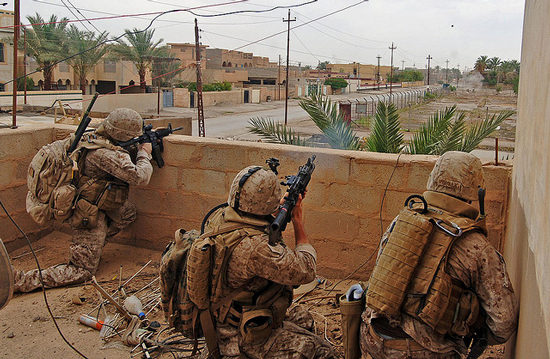 |
|
US Marine Corps Corporal Jeremy Rugg fires an HE grenade towards an enemy position during a firefight in Ramadi, Iraq, as Corporal Julius Mitchell, left, lays covering fire and Corporal Adam Gokey, right, spots insurgent positions May 20, 2006. DoD photo by Photographer’s Mate 2nd Class Samuel C. Peterson, US Navy. |
Though it was published early last year, I only recently found time to read this outstanding piece of historical fiction by Luke Larson, a decorated former Marine infantry officer who served two tours of duty in Ramadi, Iraq. The book describes the experiences of three young lieutenants who grope their way through the ad hoc beginnings of counterinsurgency doctrine (COIN) in Anbar’s provincial capital during 2006-2007.
Larson’s combat experience and keen qualities of observation combine to great effect in this novel. While technically fictional, the story ranks among the best descriptions of Western Iraq, the Marine Corps., and COIN that I have read. The author’s ambitious scope covers almost everything: the frustration of America’s IED countermeasure struggle with insurgents; the concept of “the strategic corporal” and the intense scrutiny of waging war in today’s media environment; how tragically hard it can be to avoid civilian casualties; the American public’s relative indifference to the war; the sometime inanity – and danger – of military bureaucracy in a war zone; Anbari history; Marine culture; the bravery of Iraqis and Americans; and the utter brutality of al Qaeda. It’s also a good account of how and why the tribal Awakening and counterinsurgency strategy combined to rapidly shift the course of the war.
The book is not perfect; a small fraction of characterizations struck me as being too tidy. For example, one dialogue between two characters that anticipates the arrival of Petraeus and the incoming COIN strategy hewed a little close to the conventional narrative that has emerged about the securitization of Iraq. Admittedly, this device may have been employed to streamline things for lay readers unversed with all of the circumstances surrounding the history, but there were two or three descriptions that I took with a grain of salt.
In addition, the vast scope that makes the book such a great educational resource dilutes its pure entertainment value as a novel. The narrative bounces around between scenarios as it covers various topics, and I struggled to care about the characters at the beginning of the story. But I did come to care, and the book’s ending, though abrupt, “got me.” Without spoiling the conclusion, I can say that it will probably “get” you too, especially if you or someone you know has spent enough time in Iraq or Afghanistan.
Those complaints are minor, however. And above all, two of the book’s features stand out. First, because Larson chose to write a novel to describe his experiences, he has the freedom to employ internal monologues for Iraqis and Americans that are fictional, but utterly realistic. The format’s anonymity allows him to pull fewer punches about how folks really felt and explain things with an omniscience that is impossible in nonfiction. In this respect, the novel actually transcends many dry histories of the conflict, and in its own way comes closer to a certain aspect of the truth than any journalistic account.
Second, Larson delves into the motivations and private lives of a few Iraqi characters and effectively captures some of the incredibly interesting relationships between US military personnel and Iraqi soldiers, policemen, and civilians. One of my complaints about military-centric Western accounts of the war is that the Iraqis are often treated as abstractions or incidental players. While Senator’s Son does center on the Marines, there is enough Iraqi perspective to humanize them for American readers.
Bottom line: Senator’s Son is a good novel, a better history, and a master class in the intangibles of counterinsurgency. It’s a book that should be read by officers, NCOs and young lance corporals before they enter a COIN environment. Warfighters will relate to the scenarios and attitudes of the central characters, and the fiction will engage everyday readers as they absorb the hard lessons learned by the US military in Ramadi. Highly recommended.
Are you a dedicated reader of FDD's Long War Journal? Has our research benefitted you or your team over the years? Support our independent reporting and analysis today by considering a one-time or monthly donation. Thanks for reading! You can make a tax-deductible donation here.







